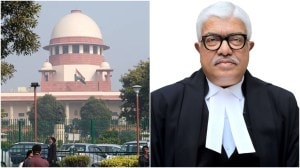‘Gentleman politician’ passes away
Ramakrishna Hegde, the gentleman of Indian politics, is no more and it’s ironic that he should pass away when the possibility of a Thir...

Ramakrishna Hegde, the gentleman of Indian politics, is no more and it’s ironic that he should pass away when the possibility of a Third Front has been revived in preparation for the coming elections.
The 76-year-old Hegde died of a brain stroke in Bangalore today. Hegde was, in the words of a friend, the quintessential democrat—one of those rare leaders who could concede a point of view with which he did not agree.
Though he held several positions in his 50 years of public life—Union Minister for Commerce, Deputy Chairman of the Planning Commission, Rajya Sabha member, general secretary of the Janata Party, and in his younger days as a freedom fighter in jail—he came into his own as the Chief Minister of Karnataka between 1983-88.
It was then that he made a transition from a Gymkhana club politician to a mass leader, though all through he remained the darling of the glitterati.
It was Hegde who saw the benefits of Panchayati Raj and devolution of power first, before Rajiv Gandhi took it up at the national level. He was the prime mover of the Lok Ayukta, of measures against defections. And it was his Minister, Abdul Naseer Saheb, who did pathbreaking work in providing drinking water in the state.Hegde’s appeal went beyond caste; he could hold crowds at an election rally in Azamgarh in Hindi just as much as he could in Kannada in Dharwar.
It was also during his stint as CM that he began to be viewed as a prime ministerial possibility. Ironically, a stature that became his undoing since he began to be viewed as a threat to others.
As a result, it was Ajit Singh, not he, who was made the president of the Janata Party though he was a frontrunner when Chandra Shekhar stepped down. Though he was the first opposition leader to stand by V P Singh after he quit the Congress in 1987—and he facilitated the formation of the Janata Dal in 1988—he was only made the Deputy Chairman of the Planning Commission when V P came to power.
In 1998, Atal Behari Vajpayee had decided to make him the Defence Minister, but colleague George Fernandes pipped him to the post. For some hours, Vajpayee is believed to have considered him for Finance Ministership after Jaswant Singh had been turned down and before the RSS zeroed in on Yashwant Sinha. He might have been a natural choice for PM in 1996, but the United Front opted for Deve Gowda, his bete noire, and later Gowda expelled him from the Janata Dal.
People charged Hegde with lacking the killer instinct needed in politics to get to the top. There was an element of truth in this and Hegde would concede this himself. Once, faced with a fait accompli, he had asked, ‘‘Is this a take-it-or-break-it proposal?’’ When informed that that was the case, he replied, ‘‘In that case I will take it. I will not break the party.’’
It was Hegde who had helped put together an alliance as far back as 1983 and had brought together different factions inside the Janata Party into a winning coalition with the CPI, CPM, BJP, Kranti Ranga Party of S.Bangarappa. Hegde—he quit the Congress when the party split in 1969, opting to go with his guru S Nijalingappa and the Congress(O)—was one of the architects of the Janata Party in 1977, when the first non-Congress government came to power in Delhi, and then again of the Janata Dal in 1988.
It was his idea, and he conveyed it to BJP chief Venkaiah Naidu, that Sushma Swaraj should contest from Bellary against Sonia Gandhi and that the BJP should put up more than a token fight.
He stormed the southern bastion of the Congress in Karnataka, being the first non-Congress CM to end its uninterrupted rule of 36 years since independence.
Things were never quite the same for the man who could have become the President, Vice President or the PM, after allegations were hurled at him for tapping phones of political adversaries, and he stepped down as CM. He took the Janata Party south of the Vindhyas but in the last few years, he had grown bitter against his colleagues who let him down and his political instincts began to fail him. He could have bounced back after the Gowda phase but, instead, decided to stay in the shadows.





- 01
- 02
- 03
- 04
- 05


























